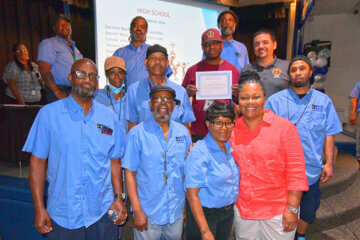Industry trade associations help teams stay on top of the latest trends, network with others in the cleaning industry, and provide a wealth of resources. There are a variety of trade associations, including ISSA and BSCAI, but APPA is definitely the big name in educational spaces.
We’ve noticed APPA growing in importance for a variety of facilities teams. Over the past few years, their influence has grown from educational facilities to teams in healthcare, offices, and more. The APPA standards especially are increasingly being used outside of education.
APPA is still most popular within educational facilities, but the more we hear about APPA from different types of facilities, the more we anticipate it’s going to grow and become more widely used outside of education.
What is APPA?
If you’re already familiar, feel free to skip down! But for those of you who could use a quick explanation, APPA – Leadership in Educational Facilities is an industry association for educational facilities teams. It originally focused on higher education, but has now expanded to other types of educational facilities. Over recent years, other facilities teams have started to join, including K-12 schools, museums, and libraries.
APPA has its own cleaning standards, educational resources, yearly conferences, and more.
Why does APPA stand for? Well, APPA’s name has a bit of an interesting backstory. It was originally called “the Association of Superintendents of Buildings and Grounds. In 1948, it became Association of Physical Plant Administrators of Universities and Colleges, which is where the APPA acronym came from. It’s gone through quite a few name changes since, but today, is known as APPA – Leadership in Educational Facilities.
What does APPA offer?
Before you make a decision on whether or not membership is worth it, you’ll want to weigh the costs and benefits. We’re going to take a look at both here.
APPA membership comes with a treasure trove of resources. Some you can purchase a la carte without membership, which is a great way to dip your toe into the water and see if APPA’s resources are valuable for your team.
We’ve found these to be the most valuable offerings:
APPA standards and books
APPA’s cleaning standards are helpful because they’re well defined, specific without being overly complicated, and used widely. (Outside educational spaces, the best analogy would be CIMS.) Our guide on What Are APPA’s 5 Levels of Clean? is a great place to get a feel for the APPA standards and how they’re used, but APPA offers much deeper guidance on how to employ them, train your staff, and more.
You can buy the APPA Organizational Guidelines for Educational Facilities books without being a member. There are three editions of the guidelines, with one each for custodial, maintenance, and grounds. Most janitorial teams will want the custodial edition. It’s a big, thick volume full of guidance and insights.
Conferences
APPA conferences are great for education and university teams. In addition to the chance to swap knowledge, share best practices, and hear from industry experts, you’ll also be able to see the latest offerings from vendors that specialize in software for educational facilities. (If you attend, come say hi to us at OrangeQC!)
APPA has state, regional, and national conferences. We recommend attending the regional conferences first; they’ll give you a good feel for what the conferences offer. If you are a director level or higher up within your organization, then also consider adding the national conference.
Continuing education
This benefit is hugely popular with existing APPA members. APPA offers a robust menu of learning opportunities, from its full-fledged online CEFP certification class (see below), to in-person trainings on your campus, to continuing education classes hosted at specific destinations.
CEFP certification
CEFP, or Certified Educational Facilities Professional, is the certification for “both aspiring and existing senior-level educational facilities professionals.” You must have at least 8 years of combined educational and work experience to even qualify for the exam — and then you’ll need to study and pass.
Attaining CEFP status is a big deal within the industry. APPA has a helpful brochure that goes in-depth on what it means to be credentialed.
The online certification course for CEFP is led by a certified facilitator, but allows participants to go at their own pace through extensive online training modules and webinars. You’ll also have a cohort of fellow professionals (which is a great bonus for networking, too).
It’s important to note that CEFP is for individual person, where ISSA’s CIMS accreditation is for the organization. (CIMS is popular with BSCs.)
Industry leadership
Part of joining APPA means entering into a network of support within the educational facilities industry. APPA definitely considers stewardship within industry part of its core mission.
That’s been especially evident in recent months, as the COVID-19 pandemic affects campuses in fundamental ways. APPA has risen to the occasion by providing free resources, town halls and webinars, survey results, and more. APPA moved quickly to help its members and others within the educational facilities industry respond.
Additionally, APPA releases a Facilities Performance Indicators (FPI) report each year to help you gauge your team’s performance and see trends within the industry. It’s free for APPA member organizations who participate, discounted for APPA member organizations who don’t participate, and available at full cost for non-members.
What does an APPA membership cost?
The cost varies depending on your institution’s size, but typically runs from several hundred dollars to a couple thousand per year. Dues are paid each April.
Other institutions, such as K-12 or museums, can join at a flat rate.
It’s important to note that APPA is a national organization with dues, but you’ll also need to join a region, which has supplemental dues on top of that. However, you’ll also have access to regional resources and connections.
Should BSCs join APPA?
It depends!
If you are a BSC without educational clients, we recommend you first buy the APPA book to familiarize yourself with the cleaning standards. That’s a great first step and will give you an idea of whether your team would benefit from more involvement with APPA.
If you’re a BSC with a growing educational client base and plan to focus on the industry, you should definitely consider APPA membership. You could also decide to start by attending a regional conference, purchasing a book, or accessing continuing education materials.
If you’re a BSC without an educational client base, or you don’t plan on specializing in that area, your first stop should be ISSA. (Learn more about what ISSA offers and what to consider before joining.)
For more insight into educational facilities, check out our recent articles — especially the story of how UMN’s Office of Classroom Management boosted classroom readiness by an astonishing 54%.



